-
Bhutan
In Bhutan, happiness is organic
 In 2012 the Kingdom of Bhutan announced its wish to live on 100 % organic agriculture. The Minister of Agriculture at the time, Pema Gyamtsho, declared: «Intensive agriculture, because it implies the use of so many chemicals, is not in keeping with our belief in Buddhism, which calls for us to live in harmony with nature. We like to see insects happy and plants happy.» After ploughing dark furrows, by using so many fertilisers, weedkillers and pesticides made from petrochemicals, farmers are gradually committing to the agricultural transition to sustainable food production. Landlocked between two giants, China and India, this country of 700,000 inhabitants had already set itself apart by choosing a development model based not on the measurement of GDP (gross domestic product) but on that of gross national happiness (GNH).
In 2012 the Kingdom of Bhutan announced its wish to live on 100 % organic agriculture. The Minister of Agriculture at the time, Pema Gyamtsho, declared: «Intensive agriculture, because it implies the use of so many chemicals, is not in keeping with our belief in Buddhism, which calls for us to live in harmony with nature. We like to see insects happy and plants happy.» After ploughing dark furrows, by using so many fertilisers, weedkillers and pesticides made from petrochemicals, farmers are gradually committing to the agricultural transition to sustainable food production. Landlocked between two giants, China and India, this country of 700,000 inhabitants had already set itself apart by choosing a development model based not on the measurement of GDP (gross domestic product) but on that of gross national happiness (GNH).
Texts: Aude Raux | Photography: Éléonore Henry de Frahan
Meditation is my only medicine. If everyone looked after his own «inner life» the climate would not be disrupted. We would reconnect with nature. Fortunately, our leaders are aware of the need to preserve our eco-system.”
Jigme Tshering, farmerTraining in organic farming techniques
Yuden and Sangay Dorji grow vegetables on terraces in the foothills of the Himalayas. In the distance, clouds swathe the tops of dense trees, which rustle in the wind, giving voice to the spirits, guardians of the forest. The memories of this couple of farmers are as hard as stone: «Because of the chemicals, the soil became hard and compacted, like pebbles in the end.» During a free training course given in 2012 by the Ministry of Agriculture and Forests, Yuden and Sangay Dorji learned about the techniques of organic farming. “We were advised to use manure as a natural fertiliser to feed the soil, so we put ferns in our cow shed. To make an organic insecticide, we mix urine with cow’s milk and dilute it with water. And finally, we do our weeding by hand. Since we having been applying these methods, the soil has become soft and easy to plough.”
Challenges to be met
According to Sonam Tashi, senior lecturer at the College of Natural Resources, «Bhutan could achieve all-organic status by 2025.» Among the challenges to be met is access to water: a country with plenty of rivers, Bhutan produces hydro-electric power, but because of a shortage of funding, it is unable to invest enough in reservoirs, pumps and piping to irrigate its farmland. Other challenges include the poor state of its roads and wild animals (elephants, boar and deer) that cause huge amounts of damage in the fields. Sonam Tashi also mentions the rural exodus. Agriculture employs 60% of the labour force, but young people, more and more of whom now attend school – free of charge – do not want to return to the hard work in the fields after their studies. But organic agriculture requires workers.
Optimising the natural cultivation of the land
Thanks to its geography, which varies between subtropical plains in the south, situated at an altitude of 200 metres, and subalpine mountains in the north, where the summits reach 7,570 metres, Bhutan can grow anything. Furthermore, the farmland is mainly made up of small (one hectare on average) and scattered plots, which do not lend themselves easily to intensive farming. Most farmers, about 60%, already do not use chemical fertilisers and weedkillers or pesticides. And the rest only use them in small quantities. “We are therefore starting from a high threshold», explains a confident Kesang Tshomo, coordinator of the National Organic Program. In fact many farmers are already aware that these substances are harmful. Other reasons: those who live in remote areas, away from the roads, do not have easy access to these products imported from India by the government, which controls their sale. And these inputs are also expensive. Finally, our role is primarily to help farmers optimise the earth’s natural resources”.
Seeing a seed germinate and turn into a vegetable, then selling produce that is respectful of the environment and good for farmers and consumers’ health makes me happy.”
Danka Dorji, farmer